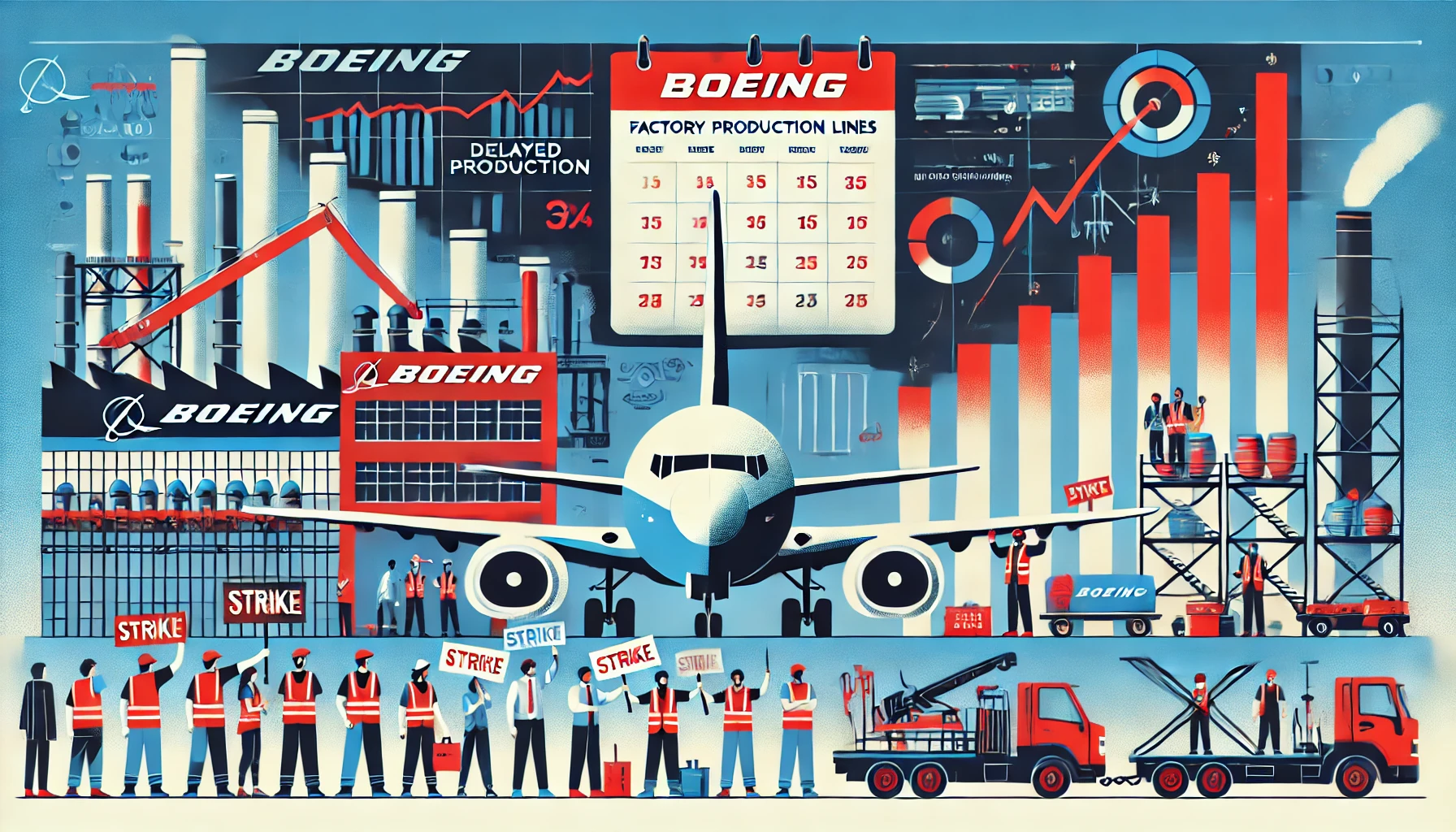The Boeing Strike and Its Broader Impact: From Union Disputes to Cost-Cutting Measures and Delayed Deliveries
In 2024, Boeing has found itself grappling with multiple crises, including a labor strike, furloughs, and cost-cutting measures. These challenges are impacting not just the company’s production of aircraft like the Boeing 737 but also its workforce and financial outlook. As Boeing navigates this turbulent period, it’s essential to understand how these issues interact and affect the aerospace industry.
In this blog, we’ll explore Boeing’s ongoing labor disputes, union negotiations, furloughs, and how the company’s efforts to cut costs are reshaping its workforce. We’ll also discuss the delays in 737 deliveries caused by the strike and how these disruptions may influence Boeing’s financial stability and market share.
Boeing Strike 2024: A Major Labor Dispute
The Boeing strike 2024 represents a significant turning point for both the company and the broader aerospace industry. The strike began when machinists, engineers, and other essential workers demanded better working conditions, higher wages, and protections against job cuts. As negotiations with Boeing management stalled, workers initiated the largest strike at Boeing in over a decade.
Union Negotiations and Labor Dispute
The core issue driving the Boeing labor dispute is a breakdown in union negotiations. The Boeing machinist strike was called after the International Association of Machinists and Aerospace Workers (IAM) failed to reach a new labor agreement with Boeing. Central to the dispute are concerns about wage increases, job security, and health benefits. The unions have accused Boeing of prioritizing shareholders and cost-cutting over employee welfare(FreightWaves).
While union leaders have signaled their willingness to continue talks, the labor dispute has yet to see a resolution. As of October 2024, the strike remains ongoing, and Boeing’s management has expressed frustration with the unions’ demands, noting that the company has already offered several concessions.
Boeing Furloughs and Cost-Cutting Measures: Impact on the Workforce
In response to the strike and its mounting operational costs, Boeing has implemented significant cost-cutting measures. These steps include freezing new hires, laying off workers, and placing others on furlough.
Boeing Furloughs 2024 and Hiring Freeze
Boeing has implemented furloughs across its operations in 2024 as part of its strategy to mitigate the financial strain caused by the strike. Thousands of workers, including engineers and production line staff, have been placed on temporary unpaid leave. Additionally, Boeing has instituted a hiring freeze, halting recruitment efforts for critical roles across the company(FreightWaves).
These decisions have sparked criticism from labor unions, which argue that Boeing’s cost-cutting measures are shortsighted and will lead to a loss of talent. Boeing, however, contends that the furloughs and hiring freeze are necessary to preserve the company’s financial health during this challenging period.
Boeing Layoffs: A Long-Term Cost-Cutting Strategy
In addition to furloughs, Boeing has also initiated layoffs as part of its long-term strategy to reduce costs. While the full extent of the layoffs remains unclear, reports indicate that thousands of employees could be affected. The company is focused on streamlining its operations, and unfortunately, this means cutting jobs in areas deemed non-essential(FreightWaves).
Boeing 737 Deliveries Impacted by Strike
One of the most significant consequences of the ongoing strike is its impact on Boeing 737 deliveries. The Boeing machinist strike has directly affected production schedules, leading to delays in aircraft deliveries. The Boeing 737, one of the company’s most popular and widely used models, has seen its production line slow to a crawl as a result of the strike.
Delayed 737 Deliveries and Financial Fallout
As the strike drags on, the delays in 737 deliveries are becoming a significant issue for Boeing’s financial outlook. Customers who have placed orders for the 737 are now facing months-long delays, and some have threatened to cancel or defer their orders if the situation is not resolved soon. This has created a ripple effect throughout the industry, with airlines and leasing companies scrambling to adjust their schedules to accommodate the delivery delays(FreightWaves).
The financial impact of these delays could be severe. Analysts estimate that Boeing could lose billions of dollars in revenue if it cannot resolve the strike and return to normal production levels in the coming months. The company has already been forced to revise its delivery targets for 2024, which could further damage its market position.
Boeing Strike News: A Look at the Broader Market Implications
The Boeing strike news has dominated headlines in the aerospace industry, and the broader market implications are becoming increasingly evident. With production halted and deliveries delayed, Boeing’s competitors are seizing the opportunity to gain market share. Airbus, in particular, has benefited from Boeing’s struggles, as airlines that were considering Boeing aircraft are now looking to Airbus to fulfill their orders.
Boeing’s Financial Outlook: What’s Next?
The ongoing strike and its related cost-cutting measures have cast a shadow over Boeing’s financial outlook for 2024 and beyond. The company has already warned investors that its third-quarter earnings will be significantly impacted by the strike, and analysts are revising their forecasts for Boeing’s performance in 2024.
Boeing’s management has remained optimistic, however, suggesting that once the strike is resolved, the company will be able to ramp up production and recover from the delays in 737 deliveries. Still, much depends on the outcome of the labor dispute and whether Boeing can secure a deal with the unions that satisfies both parties(FreightWaves).
Navigating a Turbulent Period
As Boeing faces the most significant labor dispute in years, the company is also contending with broader challenges, including furloughs, layoffs, and cost-cutting measures. The Boeing machinist strike has had a profound impact on the company’s ability to deliver key aircraft like the 737, and the financial consequences are beginning to take their toll. While Boeing’s management remains hopeful that a resolution will be reached, the road ahead is uncertain.
The Boeing strike news highlights the delicate balance between labor relations and corporate strategy in the aerospace industry. As the strike continues, Boeing will need to carefully navigate its union negotiations and manage its cost-cutting measures to avoid further disruptions to its operations and financial performance.
For more detailed insights into how labor strikes impact industries and companies like Boeing, visit Regent Studies for comprehensive resources on labor relations and economic analysis.



